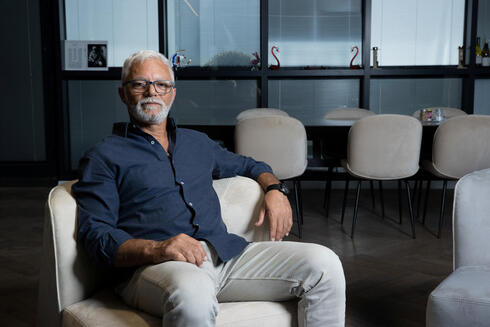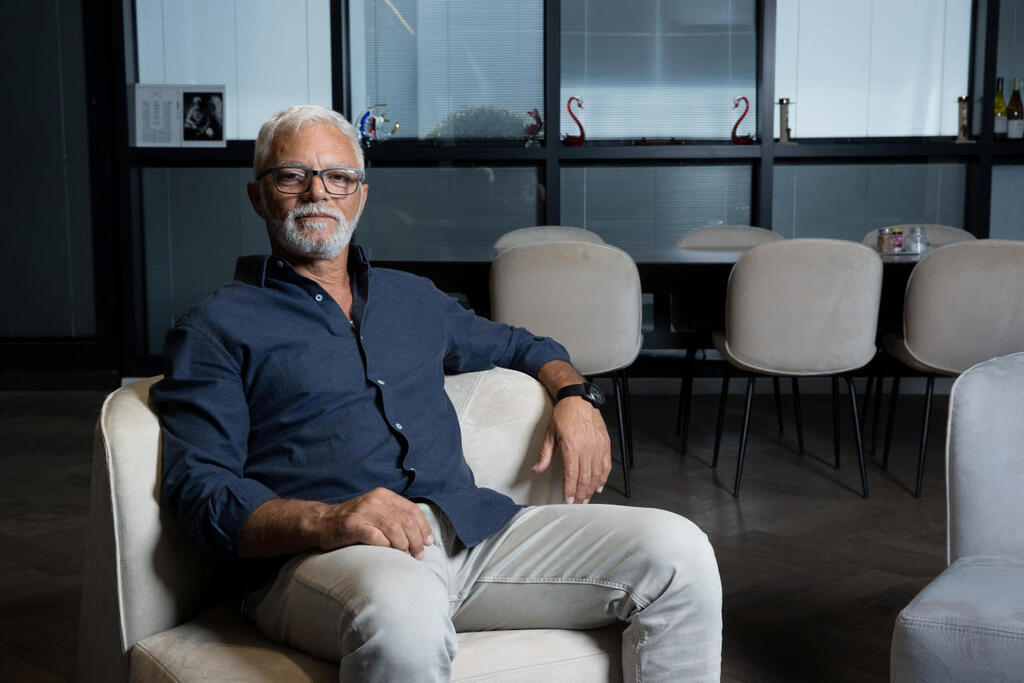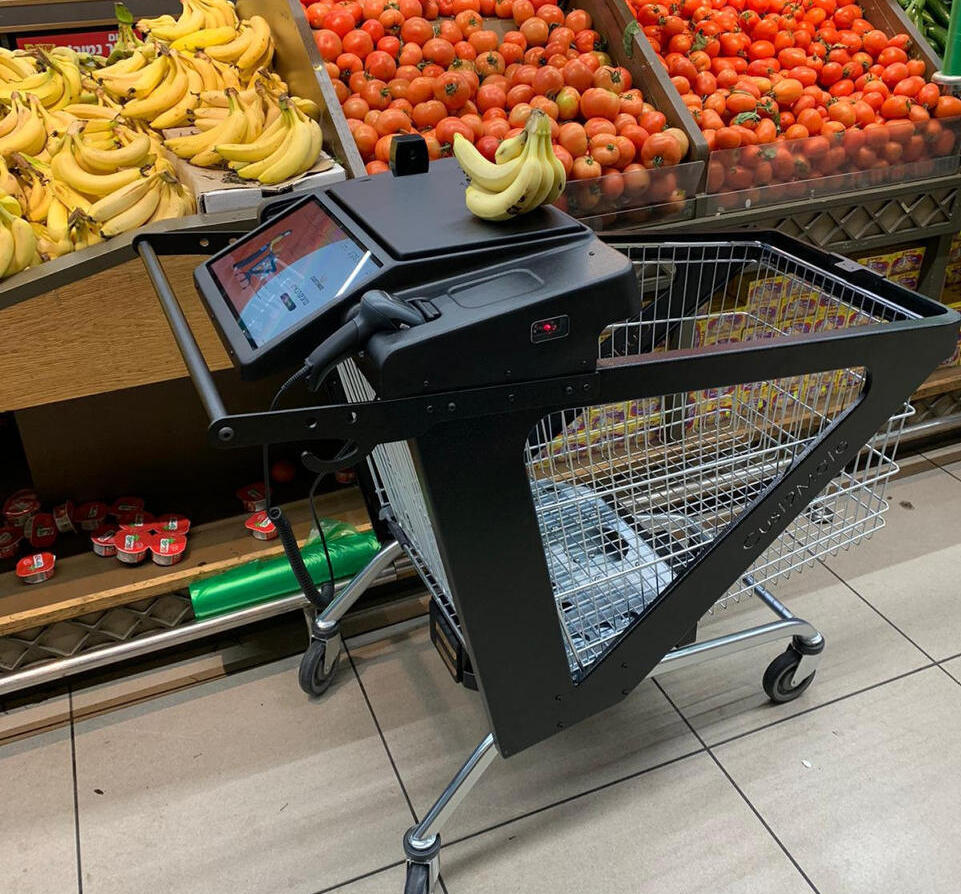
Interview
Yochananof's CEO is a high-tech investor to be reckoned with
From investing in transport drones to sugar-free sugar, Eitan Yochanaof is more than just the head of one of Israel’s leading supermarket chains
Nothing at Eitan Yochananof’s offices - who is one of the controlling owners and CEO of one of the largest retail chains in Israel - tells much about our plan to discuss investing in startups. The office in Rehovot, which is located above the chain's flagship branch, functions as a spacious living room with a huge dining area and kitchen. And no, this is not a kitchen filled with fresh fruits, vegetables, and pastries - like those in typical high tech offices, but a real kitchen with a stove and oven.
Throughout the meeting, it’s difficult to ignore the sounds and smells of the Yochananof family chef’s cooking and frying. The family plans to sit down later in the day for a joint lunch, which happens almost daily. In short, the family seems to be the furthest thing imaginable from the standard high-tech industry: it’s a family business where the father, Mordechai serves as chairman, the sister, Sarit, is the deputy CEO, the daughter, Noa runs the online sales department, and the uncle, Effie, oversees the truck fleets. And all of this with an office living room set up in a classic design, with home-cooked food - something that seems miles away from Tel Aviv’s tech center.
But even this meeting with Yochananof was born of what was essentially a high-tech event, in which he appeared seemingly outside the ordinary context of the retail worlds. Yochananof was almost insulted by the question of what he was doing at the event, because far from the spotlight, the man who first founded the Yochananof chain of supermarkets 30 years ago with his father and brother, had built for himself a kind of small start-up incubator. In addition to the well-publicized investment in the smart cart company A2Z, Yochananof has invested tens of millions of shekels in recent years in a number of start-up companies that are now being exposed for the first time in Calcalist.
The “Yochananof Incubator” has holdings in six projects at various stages of maturity and in various fields, from logistics management software, through transport drones to sugar-free sugar. The common denominator for all of them is that their activities concern Yochananof’s main baby - the supermarkets - as well as the high stakes he holds in companies, unlike angels or venture capital funds that usually settle for smaller holdings. In some companies like A2Z, the chain owns the stake and in some Yochananof invests privately, but in all cases, he is very involved, there are those who say too much, certainly not at the level tech companies are accustomed to.
"I'm not looking for an IPO"
Do entrepreneurs even know you're kind of an angel?
"I'm not an angel, because I'm much more involved, I have something to contribute beyond money, far beyond money. Money is the small part. I do not connect to the word angel because I see all sorts of things and understand that success is in the middle between amazing ideas and ability. Many times start-ups fall because of the implementation."
What kind of entrepreneurs come to you and present their projects? After all, your name is not the first thing that comes up in the context of investing in high-tech?
"I'm connected to the right places and know everyone in the country personally. I also always answer everyone's calls and everyone knows I'm accessible and not filtering out people. Just yesterday a guy called me and asked to meet with me - I told him I had no time but 'you caught me in the car, so talk'. He’s an interesting guy and I might invest in him later. But there are also companies that come to me because I lecture in places like Reichman University and Microsoft. I lecture on success because there are certain things that my age and experience can add value to. I do not think I'm the smartest, I saw the kids at the Interdisciplinary Center of Excellence and they are amazing. Then they come to me with ideas, I see a few presentations every week.”
And what’s next? What is your exit strategy?
"I build these companies together with the founders and enjoy it from the very first day. I am not looking for the IPO, but proof that the technologies are applicable as with the carts for example that at first it seemed delusional that it would happen and today they are in most of Yochananof's branches. What matters to me is not to exit or to sell to someone else, I want to see those companies become operational. I am angry when they say that industry cannot survive in Israel.”
If you are not looking for the return, even though the investment in A2Z made an exceptional profit for the chain last year and enabled a generous dividend distribution, what is your purpose in investing in high-tech?
"As a retail company that is constantly streamlining, we are constantly looking for ideas, especially those that are born out of the needs of the system. A network of supermarkets is like an autonomous country - there is no field that does not exist in it. From raw materials like ceramics to computers, screens and glass, concrete, sand and such in all areas. This is how the desire and interest in start-ups was born. Shopping carts are perhaps the most famous part, but there is also a need in software. There is a necessity to adapt to the needs of the chain and there it differs from company to company. One of the big problems in the retail industry is that the platforms are large and heavy, but do not always provide an answer. When you turn to a company like Retalix (one of the oldest players in the country in the field of cash register management and sales floor technology) that is already integrated in your systems and explain that you now need a solution for certain needs, then first of all the costs are insane and the relationship with the people developing the solution is very loose.
"Over the years we realized that if we did not take care of it ourselves, we would not succeed. At first we connected with people from the software industry and brought them here, but then we participated in the founding process and funded Algoretail. Because Algoretail works closely with us and all the intellect comes from Yochananof, they know how to tie the ability to the actual need. With all due respect to the well-known companies such as Trigo or Trax (well-known Israeli start-ups that have developed computer vision solutions for the retail world and raised hundreds of millions of dollars), it is true that you can fly in the air, but you don’t always have to, sometimes you can just take the elevator.”
Algoretail was founded in 2018 by Ariel Hubara and Josh Shechter to develop software for more efficient inventory and shelf management. The company currently employs 30 people and its value after Yochananof's investment is $25 million. Yochananof, who owns 20% of the company through a $5 million investment made by the supermarket chain in 2021, explains that the data collected at branches, cash registers and headquarters is used to build and update an algorithm that helps predict inventory needs. Thus, if in previous years there was a high demand for a particular product in a particular month, the software will know to warn that the product must be ordered. The software also knows how to tell which products sold more in the evening as opposed to the morning.
"It sounds simple, but start-ups growing only in the worlds of technology and VC funds do not always solve the important problems. If the world for example now loves camera and image recognition solutions which are popular then everyone will push the related technologies. But this is not the pain point of the chains in the field. In the field one of the biggest problems in the retail world is loss of sales, it is a much bigger problem than excess inventory. As a general rule, 20% of the products produce 80% of turnover and these are the products we run out of. We have reached a situation where we hold 11 days of stock compared to an average of 60 days of stock on the market due to Algoretail software, and we have been working with them for four years."
Retalix does not know how to do that?
"All the big players have standard inventory software but it does not work at such a level and Retalix and their competitors are very angry with us. We are exposed to this anger when we have to interface at the checkout with the Algoretail software."
But in the end for the company to be truly successful, your competitors need to buy the software too and then you lose the advantage.
"I am not enthusiastic that these technologies might reach our competitors, but there is no reason to worry because the ego in our industry is so great that they take care of this themselves and we do not face this dilemma," laughs Yochananof. "But the Israeli market is for us an experiment and what interests us is the international market. They started participating in exhibitions and there is interest."
Working with Algoretail was Yochananof's first exposure to technology and preceded the smart carts which are of course a more "sexy" product that also generated interest due to the listing of A2Z on Nasdaq while also being traded on the Toronto Stock Exchange (began trading in January with a market cap of $260 million, and now stands at around $150 million). The deployment at Yochananof branches is almost complete, although bugs such as the width of the carts that are difficult to navigate in the branches and the fact that it is not possible to leave them outside the store are still to be resolved. So in order to transfer the shopping bags to the car you have to move all the bags into a regular cart. "My sister has been talking about smart carts for years, with the vision being to reduce the customer's touch on the product as much as possible," says Yohananof, adding that the system is still not perfect and that there is still work to be done.
"They do not understand the workers of Generation Z"
While through the chain Yohananof invests in companies with a clear affinity for its activities, in the personal investment portfolio he allows himself to "go wild". One of the companies he has invested in is Deeb which has developed an app for connecting employers and casual workers and still operates in stealth mode. The app is something between Fiver and Tinder of short-term work and it also enables a function of transferring payment for the work performed. Yochananof invested NIS 5.5 million (approximately $1.7 million) in the company with his money for a 17% stake in the company founded by Nir Goldstein and Itai Sudai.
"Most employers today do not understand Generation Z employees and this is one of the reasons for the severe shortage of employees. They work there, but they do not communicate with them properly and do not look for them in the right places. The Deeb app, which has only been operating a pilot for a few months, already has 30,000 employees with an employee card that allows the employer to contact them at the click of a button. Even a business can advertise its card and what it needs. This generation of young people is not really looking for a long-term relationship at work and a high commitment to any company, and companies, especially in Israel, in the U.S. it is already starting to change, do not understand that they no longer 'own' the employee. The employee wants you to tell them directly and clearly, and there's no problem with that, ‘let me come and go whenever I want’," he says.
Another start-up that is sprouting in Yochananof's incubator is Down-Wind, of which he has recently reached an even more significant holding of 51% after investing NIS 15 million (approximately $4.6 million). It is a long-standing company, founded in 2008 by a group of air force veterans, or as Yochananof dubs them "veterans of all the interesting units in the IDF" and went through quite a few ups and downs along the way. Today, only one of the founders remains, Ehud Harush, who owns the company's shares alongside Yochananof. The company is engaged in a technologically complex and highly regulated field of construction of transport drones that are capable of transporting large quantities of agricultural produce and spray materials.
According to Yohananof, Down-Wind is the only company in Israel with a permit to fly transport drones and is currently in a pilot with the Yeruham Municipality, which is trying to promote a kind of "bubble" of drone-approved airfields to promote the field for commercial uses.
Yochananof's latest investment was also in a long-standing company. Resugar was born in one of the laboratories of the Weizmann Institute and is currently being built as a commercial company by Niv Ben Ami and Ron Livni. The company is aiming to change the chemical formula of the sugar molecules so that instead of becoming carbohydrates they will break down like honey and have zero caloric value.
"Resugar's engineered sugar is now incorporated into Nestlé ice cream as part of a pilot. The main idea is to allow regular sugar sweetening rather than substitutes that change the taste, texture and volume of the product. At this point it is a very small company of less than ten employees, but already has registered patents."
You get into very significant holdings in companies that interest you, and this can ultimately deter other investors and make it difficult for companies to develop.
"25%-30% in a start-up is not much, because I have the ability to give them the long term and this is in contrast to small investment funds. The fact is that most entrepreneurs are so diluted over time that they have nothing left and that is part of the reasons for failure.”
Do you have budget constraints?
"I do not have a closed budget, money exists to spend it. Here I had a Rolex watch and it was stolen from my house. Since then I have given up wearing a watch on my wrist. I am also very loving, believing and involved in the metaverse. We buy many products for emotion and I think it will allow us to pay less for those worlds. For example, buying a luxury car is a virtual experience. Anyone who has experienced it knows that using a Porsche is the same as driving any four-wheeled vehicle, you just bought the emotion. It's enough for my avatar to drive a Porsche in the future and have a Rolex on hand."
First published: 09:12, 22.04.22















